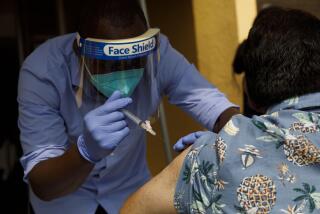Free H1N1 clinics swamped
- Share via
Los Angeles County’s free H1N1 flu clinics opened last week amid public health officials’ promises to aggressively vaccinate people at highest risk, especially the uninsured. Instead, overwhelmed clinic staff began vaccinating many people who were not supposed to be first in line for protection, officials said Tuesday.
“We thought it was important to get to as many people as quickly as possible,” said Dr. Jonathan E. Fielding, the county’s director of public health. “We were assuming that the private sector was going to be getting a lot more vaccine a lot faster than they did.”
Fielding conceded that county officials failed to conserve vaccine supplies early on, unwilling to turn away those who had traveled and waited in line. By Tuesday, they faced a vaccine shortage, with only enough doses to stay open through Nov. 4 instead of the planned Nov. 8.
“How do those people feel when they came a long way and in many cases are part of a family?” Fielding said. “What do we say -- we’ll do your children but we won’t do you?”
In recent days as demand for the scarce vaccines has increased and anxiety has grown, officials with the Centers for Disease Control and Prevention say many public health clinics have reported needing to intensify screening to take care of the most vulnerable first.
“They’re adapting and making rolling changes with vaccine availability,” said CDC spokesman Joe Quimby.
State and federal officials have recommended, but cannot mandate, that local governments vaccinate federal priority groups first. Those groups include: pregnant women, people living with or caring for infants under 6 months old, emergency medical services personnel and healthcare workers, children and young adults ages 6 months to 24, and people 25 to 64 years old with chronic medical conditions such as heart or lung disease, asthma, diabetes or weakened immune systems.
In L.A. County an estimated 5.5 million people fall into priority categories, Fielding said. Only about 50,000 people have been vaccinated since the county’s first clinic opened Friday. County staff -- busy trying to handle the growing lines -- have not tracked how many of those vaccinated were among priority groups, Fielding said.
At Los Angeles area clinics, health officials said many in the long lines had insurance but reported that their personal doctors did not have the vaccine. Others had traveled from nearby counties.
On Saturday, staff had to close a drive-through clinic in Redondo Beach after being swamped. Staff at county clinics were vaccinating 300 people an hour, Fielding said.
Fielding, who personally screened some in line at a Compton clinic Tuesday, promised stricter guidelines going forward. He blamed the local shortage on national delays in manufacturing the vaccine and a surge in demand after President Obama’s Saturday declaration of a national H1N1 flu emergency.
So far, clinic staff are continuing to vaccinate eligible people from neighboring counties that have yet to open free clinics. If their ranks increase, however, they may be turned away, Fielding said.
“It’s hard to know what the balance is,” he said.
Orange County public health officials, who plan to open their first two public clinics Saturday, will restrict vaccines to healthy children 2 to 9 years old and healthy adults age 49 and under caring for infants 6 months old and younger. Those who do not qualify will be turned away, according to Deanne Thompson, spokeswoman for the Orange County Health Care Agency. They have received about 10,000 vaccines for public clinics, she said.
“There is a limited supply and we have to make sure it gets to those who need it the most,” Thompson said.
With so little vaccine on hand, many public health officials are struggling to ensure that those most in need are helped first.
In Portland, Ore., public health officials heightened screening after clinic staff were mobbed last Thursday by 1,200 people seeking the vaccine. A spokeswoman said they ended up vaccinating some who were ineligible while denying others who qualified.
In Phoenix last weekend, county health officials restricted the 50,000 vaccines available at free clinics to children up to age 5, children with underlying health conditions, caregivers for children younger than 6 months old and healthcare workers.
In Las Vegas, where free clinics have been distributing 600 vaccines an hour, officials this week were distributing only nasal spray vaccines, and limiting them to those ages 2 to 24, healthcare workers with patient contact and caregivers of children younger than 6 months old.
Clinic staff members question those waiting in line, but as in Los Angeles, they rely on people to be honest about whether they are eligible.
“We are kind of going on the honor system,” spokeswoman Stephanie Bethel said.
Federal officials have distributed the vaccines to the states in proportion to population. They were expected to have supplied 40 million vaccines by this week, but manufacturing delays reduced the supply to 11 million, Fielding said. L.A. County officials were expecting a shipment of 94,000 vaccines this week, but it was unclear how much more will be shipped in coming weeks.
Fielding cautioned that as vaccine supplies dwindle, clinic staff may vaccinate only those in the two groups considered at greatest risk: pregnant women and caregivers for children younger than 6 months old. Clinics that run out of vaccines will close early, he said, and new clinics may be canceled if vaccine shipments are delayed.
--
molly.hennessy-fiske @latimes.com
More to Read
Sign up for Essential California
The most important California stories and recommendations in your inbox every morning.
You may occasionally receive promotional content from the Los Angeles Times.














